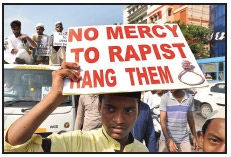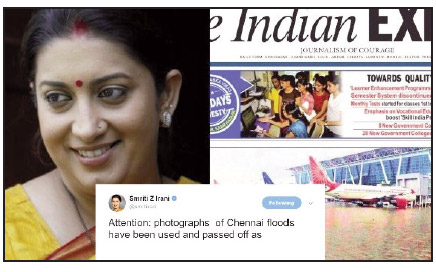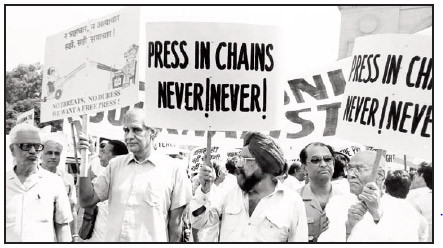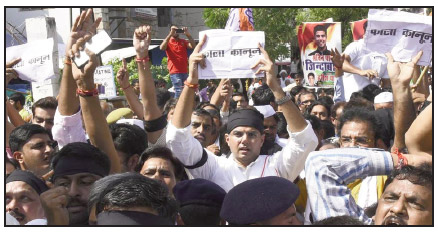Rapes : Fear of the Law
the only answer
 At long last a better
sense has prevailed
upon the Central
government and it
has decided to impose death
penalty on child rapists. Fine.
At long last a better
sense has prevailed
upon the Central
government and it
has decided to impose death
penalty on child rapists. Fine.
But why only for rapists of
children below 12? Why leave
out all those women, irrespective of the age factor, who become
the victims of such heinous crimes? As a nation, we have to ensure
foolproof safety and honour of women as well as children. For
years, I have been pleading for death penalty and setting up of a
chain of fast-track courts, both in urban and rural India, for such
gruesome criminal acts.
Forget about those who under the cover of "human rights" or
political considerations stand for the rapists. For us, women's
rights and honour are more sacred than anything else. It is a pity
that incidents of rape are often given political colours instead of
becoming a display of unified resolve to fix up criminals. The
latest such case relates to Kathua (Jammu) in which an eight-yearold
child who was raped and murdered.
In May 2017 two bus molestation incidents in Punjab – one at
Moga and the other near Khanna – were given a political twist as
the heinous acts took place in the then SAD-BJP – run state of
Punjab. In the Moga incident a 13-year-old girl was molested and
thrown out of a moving bus. Regrettably, such shockingly
shameful incidents of rape and murder continue everywhere. So
do replay acts of shadow-boxing among rival political actors.
True, Indians are, by and large, highly religious people. But
amidst changing social habits, norms, male mindset, ethical
standards nothing can work except Fear of the Law. Beyond the
provisions of the latest ordinance by the Modi government, we
urgently need radical reforms in legal provisions, judicial
processes, police forces and delinking investigation from the law
enforcement. We also ought to have an effective women police
force.
It is true that in the wake of the Justice Verma committee
recommendations after the Nirbhaya incident of December 12,
2012, certain legal provisions relating to sexual offences were
strengthened by the UPA government. Some provisions of the
Criminal Law Amendment Act have been changed. Even the
definition of rape has been expanded to incorporate offences like
acid attack, sexual harassment, voyeurism and stalking. The Modi
government also made changes in the Juvenile Justice Act under
which juveniles above 16 are tried as adults in serious crimes like
rape and murder.
The latest ordinance is no doubt a step forward in the country's
relentless battles against children women rapes and murders. But
I doubt whether it would be a deterrent enough for crimes against
them.
What now comes as a shock is the statement of the BJP
government's Union Minister Santosh Gangwar. He says, "in such
a huge country, if one or two cases are reported, one should not
make such a big deal out of it". I wonder whether Prime Minister
Narendra Modi's gag order to BJP MPs and MLAs on "not to give
masala" to the media by their "needless remarks" will work !
It is equally disturbing that the minister does not know the
horror stories of the nation. As many as over 40 rapes take place
in the country every hour. Under the BJP-run Central government
in 2016 as many 3,38,594 crimes against women took place. Of
these 38,947 (11 per cent) were rape cases. Jammu and Kashmir
reported 256 rapes in 2016. In the BJP-run Uttar Pradesh, there
were cases of 4,816 rapes. In Madhya Pradesh and Maharashtra
there were 4,882 and 4,189 such incidents respectively. And only
one in four rapists is convicted.
We have also ever increasing number of MPs with criminal
records. What is more, 30 per cent of all state legislators have a
criminal background and of 1,581 sitting legislators with criminal
records, 51 are involved in crimes against women alone. Of 48
MLAs of these, four have rape cases against them.
No doubt, public outcry over Unnao, Kathua and number of
such cases of crimes against children and women has been rising.
We have numerous politicians in our midst who still blame
women for being dressed "provocatively" and who are inclined to
condone male crimes by saying "boys will be boys" and "mistakes
can occur" or "what a big deal" !
It is legitimate to expect that our politicians should show the
way and try to change the outlandish male mindset. As in many
other cases, here too the responsibility of reforming the male
mind rests with the civil society and social reformers. Enough is
enough.
We have to keep up the fight on for the safety, dignity and
honour of women and children. In the final analysis, nothing can
work if there is no fear of the law among potential criminals. Look
at Singapore and Hong Kong. Even in the middle of night a
woman can walk safely to her home without fear. This element of
fear can be generated, if the laws are not only enforced ruthlessly
but also are seen to be enforced by the police without fear or
favour of the powers-that-be.
Another critical element which could have electrifying effect in
the prevailing perverse atmosphere is a clear and categorical
provision in the law for death sentence for all sorts of rapists.
Equally pertinent is fast-tracking of cases concerning sexual
offences against girls and women. Fast-track courts under High
Court-level judges should be expected to give their verdicts within
three months. The Supreme Court needs to promptly look into all
such related matters. There can be no half way approach to justice.
The problem is very serious. We, as a people and media persons,
must force the authorities as well as the judiciary to act fast.
Fake News and Freedom
of Media
 How does the concept of Fake News,
which got globally into currency after
the running battle of President Donald
Trump with the high-profile American
media, have any relevance to the Indian
situation? The answer to this query
could be both 'Yes' and 'No'. In the first place, against the
backdrop of the digital setting, the entire range and
dimension of India's media too has changed dramatically.
Secondly, real or fake news, in a way, is also part of the old
game of media control even in democratic
establishments, India included, to keep journalists under
leash for "reports" which may not be palatable to the
powers-that-be.
How does the concept of Fake News,
which got globally into currency after
the running battle of President Donald
Trump with the high-profile American
media, have any relevance to the Indian
situation? The answer to this query
could be both 'Yes' and 'No'. In the first place, against the
backdrop of the digital setting, the entire range and
dimension of India's media too has changed dramatically.
Secondly, real or fake news, in a way, is also part of the old
game of media control even in democratic
establishments, India included, to keep journalists under
leash for "reports" which may not be palatable to the
powers-that-be.
There is, of course, no universally accepted definition
of "fake news". In the changing world of media, the key
question has to be whether there is "a deliberate attempt
at providing manipulated or fabricated information to
mislead readers or viewers. Such matters are for media
organizations to examine and take a view, and not the
prerogative of governmental authorities.
 At a protest against the Rajiv Gandhi government's
Defamation Bill in 1988, (from left), editor and
leader of the BJP, K R Malkani; editor and activist
Kuldip Nayar; editor-author Khushwant Singh;
commentator and editor of The Statesman, C R
Irani; and founder of The Indian Express Group,
Ramnath Goenka.
I am not sure what prompted the Smriti Irani-run
Information and Broadcasting Ministry's "fake news"
order announcing new guidelines to govern the
accreditation of journalists based on screening if they are
indulging in false news. Mercifully, better sense prevailed
in the Prime Minister's Office (PMO) to set aside the I &
B Ministry's order after sharp reactions from media
bodies, including the Editors' Guild of India, Indian
Women's Press Corps, Press Association and Federation
of Press Clubs of India and Press Club of India. The Guild
rightly condemned the move as "arbitrary" and an attempt
by the government to "police the media".
At a protest against the Rajiv Gandhi government's
Defamation Bill in 1988, (from left), editor and
leader of the BJP, K R Malkani; editor and activist
Kuldip Nayar; editor-author Khushwant Singh;
commentator and editor of The Statesman, C R
Irani; and founder of The Indian Express Group,
Ramnath Goenka.
I am not sure what prompted the Smriti Irani-run
Information and Broadcasting Ministry's "fake news"
order announcing new guidelines to govern the
accreditation of journalists based on screening if they are
indulging in false news. Mercifully, better sense prevailed
in the Prime Minister's Office (PMO) to set aside the I &
B Ministry's order after sharp reactions from media
bodies, including the Editors' Guild of India, Indian
Women's Press Corps, Press Association and Federation
of Press Clubs of India and Press Club of India. The Guild
rightly condemned the move as "arbitrary" and an attempt
by the government to "police the media".
 Rajasthan Congress president Sachin Pilot, along
with supporters, during a rally to protest the
Criminal Laws (Rajasthan Amendment) Bill , 2017,
in Jaipur
The Guild clearly stated that the recent reconstitution
of the Press Council of India (PCI) was done in a manner
that gave rise to doubts over the independence of the
institution and its ability to be a neutral umpire. Even the
reconstitution of the Central Press Accreditation
Committee had led to questions over the non-transparent
process being followed by the I & B Ministry by rejecting
the Guild's nominees.
Rajasthan Congress president Sachin Pilot, along
with supporters, during a rally to protest the
Criminal Laws (Rajasthan Amendment) Bill , 2017,
in Jaipur
The Guild clearly stated that the recent reconstitution
of the Press Council of India (PCI) was done in a manner
that gave rise to doubts over the independence of the
institution and its ability to be a neutral umpire. Even the
reconstitution of the Central Press Accreditation
Committee had led to questions over the non-transparent
process being followed by the I & B Ministry by rejecting
the Guild's nominees.
Indeed, with elections on the horizon, I look at
the move as a desperate attempt to muzzle the
media and chill the voices of dissent. As the Editors' Guild
of India points out, the manner in which the
Press Council and the accreditation panel were
I am not sure what prompted the Smriti
Irani-run Information and Broadcasting
Ministry's "fake news" order announcing
new guidelines to govern the
accreditation of journalists based on
screening if they are indulging in false
news. Mercifully, better sense prevailed in
the Prime Minister's Office (PMO) to set
aside the I & B Ministry's order after sharp
reactions from media bodies, including
the Editors' Guild of India, Indian Women's
Press Corps, Press Association and
Federation of Press Clubs of India and
Press Club of India. The Guild rightly
condemned the move as "arbitrary" and an
attempt by the government to "police the
media".
reconstituted recently does raise questions of fairness and
transparency in the name of penalizing
"inconvenient" journalists and media organizations.
I must say with a total sense of pride that the press
in India has invariably acted as a watchdog of democracy.
It has reported cases of miscarriage of justice. It
has exposed the wrongs perpetuated on the weaker
sections of society by feudal lords and governmental
authorities. It has exposed some of the mightiest persons
in the area of corruption and socio-economic injustice. It
also knows how and when to pounce upon the authorities
to safeguard freedom and the people's right to
information.
Looking back, the way the journalists of all shades and
opinions united against Prime Minister Rajiv Gandhi's illconceived
Defamation Bill aimed at curbing their freedom
underlines its basic resilience. The media personnel
raised their voice against the Bihar Press Bill supported by
Prime Minister Indira Gandhi. This speaks a lot of Indian
Media Power.
Diversity and richness of the media are not ornaments
of a democracy but essential elements for survival. What,
however, is disquieting is the BJP has not learnt lessons
from the past wrong doings by the Congress government.
To give one example: the Vasundhara Raje government in
Rajasthan sought to bring in law that would curb the
media from investigating public servants. It was the
media's vehement protest that forced the BJP government
in Jaipur to drop the move.
The question here is not of the colour of the party in
power. Going by India's democratic track record, every
party in power invariably shows its teeth to bite the
freedom of the media. This cannot be accepted.
Regrettably, the Indian intelligentsia, too, has been
politicized, and it plays an increasingly partisan role in
which truth becomes the first casualty.
Viewed in this light, the Indian editors collectively have
noted that governments and parties in power have often
been charged with creating and propagating "fake news"
themselves. Besides, the country is awash with digital
platforms of all hues and opinions that operate without
constraints and which have the potential to cause far
more damage, as the Guild rightly puts it.
Be that as it may. Distorted facts, whether officially
engineered or prompted individually or by vested
interests, do not make a nation great. We, in the media
world, are committed to playing an objective and honest
role in reporting and monitoring happenings and nonhappenings.
Democracy flourishes best when thinking persons in
the media lead the people correctly and put truth and
only unbiased truth, before the nation. Pretensions,
sycophancy, fallacious reasoning, crass
commercialization, mental slavery are all danger signals
in the healthy growth of a free press. The media is too
explosive to be left to whims and fancies of rulers or
vested interests.
What, however, should be the cause of concern is the
erosion of the editor's authority in a section of the media
in favour of crude marketing manipulations or the
hanging sword of authority over journalists. We have to
serve the people. The very essence of democracy is free
and unbiased flow of information and freedom that goes
with it.






 At a protest against the Rajiv Gandhi government's
Defamation Bill in 1988, (from left), editor and
leader of the BJP, K R Malkani; editor and activist
Kuldip Nayar; editor-author Khushwant Singh;
commentator and editor of The Statesman, C R
Irani; and founder of The Indian Express Group,
Ramnath Goenka.
At a protest against the Rajiv Gandhi government's
Defamation Bill in 1988, (from left), editor and
leader of the BJP, K R Malkani; editor and activist
Kuldip Nayar; editor-author Khushwant Singh;
commentator and editor of The Statesman, C R
Irani; and founder of The Indian Express Group,
Ramnath Goenka. Rajasthan Congress president Sachin Pilot, along
with supporters, during a rally to protest the
Criminal Laws (Rajasthan Amendment) Bill , 2017,
in Jaipur
Rajasthan Congress president Sachin Pilot, along
with supporters, during a rally to protest the
Criminal Laws (Rajasthan Amendment) Bill , 2017,
in Jaipur